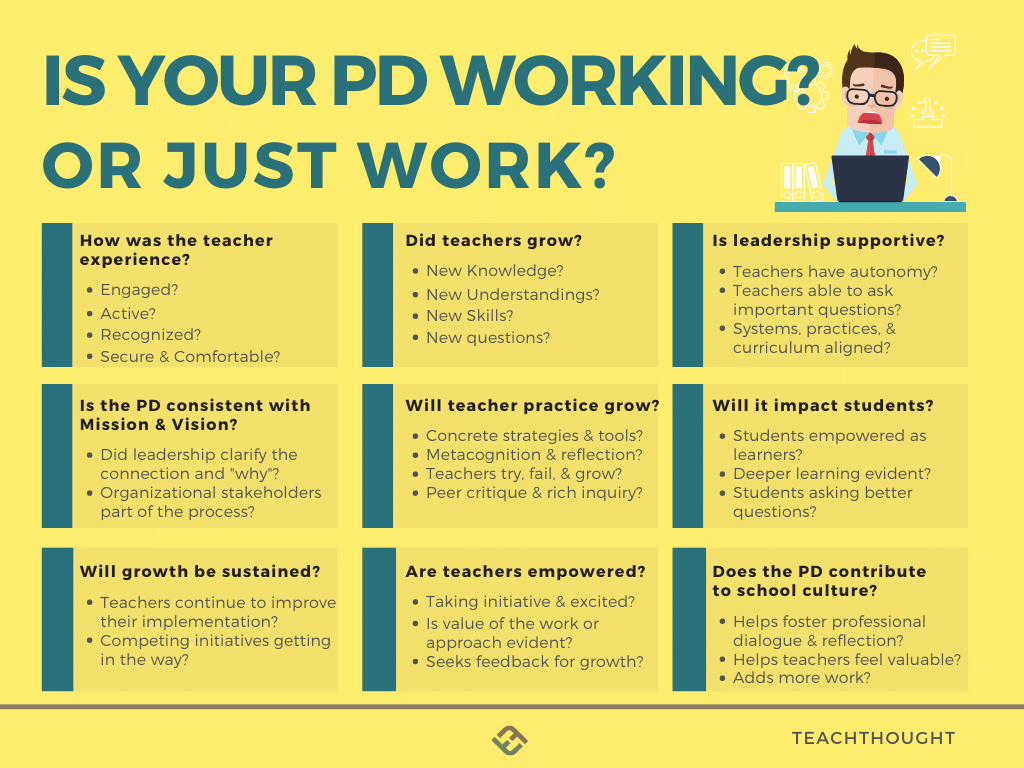
How To Know If Your PD For Teachers Is Working–Or Just Work
contributed by Drew Perkins
Ideally, as instructional leaders, those in school administration positions like principals and/or central office positions view their work as more of a sort of support role than as ‘the boss.’
While there are usually other aspects to those roles the idea is that you’re doing what you can to make it easier for your teachers to be as great as possible. One of the ways often utilized in pursuit of this is the type of professional development, but it’s certainly more than just that.
Teachers are passionate about helping their students and as a result seeking to improve their craft. That said, PD doesn’t always feel particularly helpful. In fact, it sometimes feels quite the opposite. It’s incumbent on school leaders to be intentional about the design and planning for professional development and arguably more importantly, to be reflective in the evaluation of it.
So how do you know if your professional development is working for you? Consider these nine questions.
9 Questions To Measure Professional Development Effectiveness For Schools And Teachers
How was the experience for the teacher?
Were they engaged in a variety of activities that were intellectually interesting but also kept them from atrophy in their seats? Were they physically comfortable and were there things like coffee or other basic human needs? Were they spurred to ask lots of questions important to them and was there safety in asking challenging questions? Did they feel valued and recognized as professionals and human beings?
Did teachers grow?
Did they gain new knowledge? Were they able to acquire new skills that will help them improve their craft? Are their new understandings that they uncovered in the learning process and how visible are they? Did this PD inspire more questions that might serve as a roadmap for continued professional growth?
Is leadership supportive?
When an organization’s leadership hasn’t made intentional efforts to support the changes it’s not likely to be effective even if teachers find the content worthwhile. Teachers want to feel their leadership has been thoughtful about their PD. What systems, practices, and curriculum pieces need to be considered and potentially changed to help make this work successful?
Is the PD consistent with Mission and Vision?
Too often professional development isn’t aligned with the school or district’s mission and vision. This often leads to, what feels like, frustrating and pointless professional development. Is there a process that roots professional learning consistently toward a shared target? What durable anchors do you have in place to prevent ‘initiative fatigue’?
Will teacher practice grow?
Similar to the previous question but more concerned with continuing development, will teachers try, reflect, and improve? Even if we aim for teachers to takeaway tools they can implement quickly is their a culture that incentivizes and supports improved use of strategies as they become more familiar with them? Are there systems in place that encourage positive peer critique and rich inquiry like Collaborative Lesson Study and use of protocols like those we encourage within our PBL workshops?
Will it impact students?
Ultimately we want professional development for teachers to positively impact students. Did it or will it benefit them? In what ways, how much, and for how long? Is that benefit aligned with the mission and vision and your ideal graduate? What evidence, not proof, will show that students are gaining from the work of teachers as a result of the PD?
Will growth be sustained?
This might feel redundant but almost any teacher can tell you it’s a real concern. Will teachers be allowed to continue to work on whatever they started in the PD session? What will happen when they struggle? Will this be replaced with something else without giving it time to take root and find success? I’ve written about some of these questions before in 7 Questions To Guide Your PBL Implementation Plan but quite honestly they’re not exclusive to PBL.
Are teachers empowered?
Does the PD place teachers in the role of active learning? Are they taking initiative because they’re excited about the possibilities? Does that excitement dwindle after the first 24 hours because the workshop was more about the presenter as performer? Or are teachers continuing to ‘practice’ their learnings as a true professional learning community?
Does the PD contribute to school culture?
Some of this is incumbent upon the participants but if you’re choosing an outside PD provider will they engage with teachers in ways that help further your intended school culture? You want to be sure their practices are consistent with what you want from your teachers. Are their exercises or activities requiring professional dialogue and reflection? Are they pulling the best from teachers? Or is the PD viewed as just another checkmark, hoop to jump through, or more work to be compliant?
Planning and picking professional development can be challenging. Similar to teacher’s work with students, it is often hard to find ways to meet the needs of everyone all of the time. Part of that are the systems we have in place that often relegate professional learning to certain days instead of an ongoing process.
Consistently striving for these ideals with clarity of your mission and vision as guides can yield great results if you take the time to be thoughtful in planning, implementation, and evaluation.